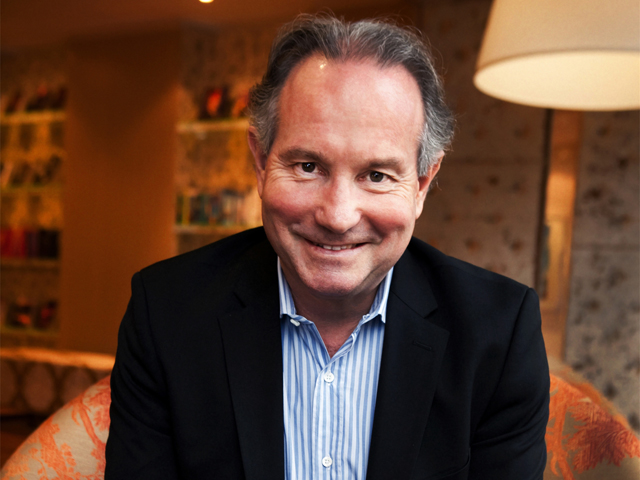Dr Ross Walker Heart Research Month Interview

New Approaches to Integrative and Preventative Cardiology on the Agenda
With 4.2 million Australians affected by cardiovascular health issues, at a cost of $5.9 billion to the country" cardiovascular health issues continue to be one of the biggest burdens to the economy and remains at the forefront of the health agenda in Australia.
Heart Research Month raises awareness about the impact heart disease has on families, friends and communities, and the importance of heart research to find new ways of supporting cardiovascular health.
Heart Research Australia supports a centre of excellence that attracts world class and emerging researchers to conduct ground-breaking research into cardiovascular health. Heart Research Day is celebrated on the 14 February – the "National Wear Red Day" – to honour those close to your heart and to raise money for research, raise awareness for heart disease and help keep families together for longer.
Natural Approaches
Increasingly, natural evidence-based therapies are in the spotlight to support heart health with researchers reporting advances in the understanding of their role. These therapies are providing an option for healthcare practitioners seeking natural approaches to support their patients' cardiovascular health.
Supported by over 20+ clinical trials"the role of Co-Enzyme Q10 in its most active form, Ubiquinol is an option for healthcare practitioners seeking natural approaches to support cardiovascular health.
These significant studies, in conjunction with ongoing heart research in Australia and around the world, presents hope for those looking for an alternative solution in getting their heart health back on track.
Interview with Dr Ross Walker"Integrative Cardiologist
Question: What is Heart Research Month?
Dr Ross Walker: February is Heart Research Month, a date in the calendar dedicated to raising awareness on the impact heart heath issues has on families, friends and communities, and the importance of heart research to find new ways of supporting cardiovascular health.
Heart Research Australia supports a centre of excellence that attracts world class and emerging researchers to conduct ground-breaking research into cardiovascular health strategies. It's not a coincidence that "National Wear Red Day" is celebrated on the 14 February, the universal date to celebrate love.
As our thoughts turn to those we keep close to our heart, Heart Research Australia encourages everyone to honour those people they love, by raising money for research, awareness for heart health, and help keep families together for longer.
Question: What message do you hope to spread during Heart Research Month?
Statistics like this can be sobering, but the more information we have at our disposal, the better equipped we are to ensure we're looking after our hearts in the best way possible.
Heart Research Month is an opportunity for health professionals and the Australian public to start a conversation about their heart health and the steps needed to maintain a healthy heart and reduce problems now and in the future.
Question: How can we reduce stress on our heart?
Dr Ross Walker: Many people write off the effects that stress and anxiety can have on our health, but your emotional health should be taken seriously- just as seriously as our physical health. Stress triggers the release of adrenaline and cortisol, which can impact your blood pressure and heart rate.
There are certain steps and even ingredients you can take today to start looking after your heart. Here are some tips to keep in mind if you want to give your heart a helping hand:
Stay positive - Laughter lowers the levels of stress hormones, reduces inflammation in the arteries, and increases "good" HDL cholesterol.
Unplug - It's impossible to escape stress when it follows you everywhere. Cut the cord. Avoid emails and TV news. Take time each day " even if it's for just 30 minutes in silence" to escape from the world.
Declutter - You must declutter your surroundings on the outside to relieve stress in the inside. Simplify your life by getting rid of the clutter that is of no value to you anyway!
Question: How can we support our own cardiovascular health?
Dr Ross Walker: I encourage people to practise the five keys to good health to reduce the risk of cardiovascular problems and support your heart heath.
Cultivate a good quality sleep habit – The quality of your day very much depends on the quality of your sleep the night before. Aim to go to bed at the same time every night, following the same pattern, whether it's a bath and some time reading, or listening to relaxing music. Remove all digital devices from your bedroom as these can disrupt your ability to turn off from the world. If you keep your bedroom cooler and regulate the temperature throughout the night, you'll find that your overall sleep quality improves.
Nutrition - Eat less and more naturally – Yes size does matter when it comes to your portion sizes. If you are looking to reduce the amount you eat, start by focusing on eating less processed food, which is high in salt, sugar, and saturated fat. Always put vegetables onto your plate first – around two cupped hands of veg is a good portion size guide, for good health and to keep you full. When serving meat or chicken, try not to be over-generous: the palm or your hand is the ideal amount. If you prefer fish, use the whole of your hand as a serving size guide. Australians of all ages on average have a poor diet"which includes insufficient daily consumption of fruit and vegetables. In fact, less than 10% of Australians eat the recommended daily amount of 5-6 servings of vegetables and 2 servings.
Load up on omegas, healthy fats and turmeric - A diet rich in omega-3 fatty acids has been shown to reduce the risk of heart disease, and additionally, reduce inflammation in the body, particularly around the joints. Load up your plate with salmon, walnuts and oils rich in essential fatty acids like flaxseed and hemp.
Exercise – This is the second most important drug on the planet. Enjoy some sort of moderate-intensity physical activity on most, ideally all, days of the week. (Moderate intensity means that you work up a sweat, but you can still hold a conversation.) Even if you don't have the time to achieve 30 minutes in one go, you can break up your walk, cycle, or run into 10- to 15-minute sessions.
Exercise has incredible benefits not only for your weight and mental health, but specifically for your heart. Cardio exercises in particular can lower blood pressure and strengthen your heart, as you slowly increase your cardiovascular endurance.
Be Happy – This is easily the most important drug on the planet. Life is short, so why spend it being unhappy? Perhaps it's time to make some changes to bring some sunshine into your life, whether it's a new hobby, meeting new people or travelling more.
Research has shown that people who maintain healthy friendship networks throughout life actually have a lower risk of heart disease. Reduced stress and anxiety as a result of these relationships plays a significant role in these findings, not to mention the vital happiness chemicals, serotonin, dopamine and oxytocin, released as a consequence of love and bonding.
 Question: What other natural approaches to cardiovascular health can we adopt?
Question: What other natural approaches to cardiovascular health can we adopt? Dr Ross Walker: Supplements can be useful when diet intake is inadequate or when life's business prevents us from eating an ideal heart healthy diet.
You've probably heard about Coenzyme Q10 (or CoQ10), a naturally occurring antioxidant in your body, but you may not have heard of Ubiquinol, the active (more easily absorbed) form of CoQ10, responsible for providing your cells with energy. Ubiquinol is an essential nutrient for the heart. Ubiquinol has also been shown to assist in maintaining healthy levels of LDL cholesterol. As we age, our natural levels of CoQ10 decline. Studies have shown that supplementing your health regime with Ubiquinol may help reduce the effects of stress and physical overexertion, inflammation caused by exercise and help muscles recover after exercise.
Question: What foods can aid in improving our cardiovascular health?
Dr Ross Walker: Chocolate
This is the news all chocolate lovers have been waiting for! A study of dark chocolate showed that consuming around 25 grams a day of dark chocolate (in some cases up to 100gms) reduced insulin resistance (which is a precursor to Type 2 diabetes) and improved fatty liver.
Cheese
A study from Italy showed that consuming a daily dose of 30grams of Grana Padano a day (a hard cheese similar to parmesan), can reduce blood pressure to the same levels as a standard pharmaceutical drug.
Antioxidants
Essentially, antioxidants help reverse the oxidation process, which turns cells into free radicals and, as a result, can cause inflammation. The process of inflammation is believed to be a huge contributor to disease, including cardiovascular disease, and many antioxidants such as polyphenols do wonders for your heart. Try to include an antioxidant rich food with every meal, such as blueberries, cinnamon and cacao.
Beans
Beans are also a key ingredient in the Mediterranean diet, alongside legumes. Beans are rich in heart-healthy B vitamins, iron and calcium, and are also fibre rich. Soluble fibre has the capability of binding to cholesterol and carrying it out of the body, making beans the equivalent to a gentle scrubbing brush for your insides!
Fat
The Mediterranean diet is considered to be the best dietary option for those at risk of cardiovascular disease, as it contains ample amounts of healthy fats from nuts, fish and olive oil.
Question: What's next in heart research?
Dr Ross Walker: The medical community remains committed to improving heart care. One area of research currently underway is the improvement in the management of hypertension. The new educational instrument, created by the University of NSW, is called the Guideline Enhancement Tool (GET), which focuses on improving the current hypertension guidelines, helping clinicians to improve their decision-making skills.
Always read the label. Use only as directed. If symptoms persist consult your healthcare professional www.ubiquinol.net.au
Interview by Brooke Hunter
Photo by Thought Catalog on Unsplash
MORE



